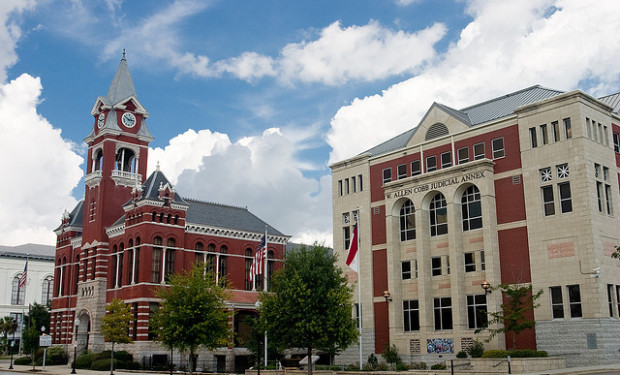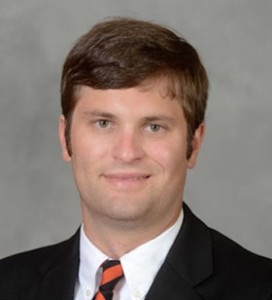Campbell Law School students excel in North Carolina and across the nation: New Hanover County Public Defender
By: Max Ashworth, 3L at Campbell University School of Law
Editor’s Note: The Campbell Law Observer is taking a break from its usual editorial cycle to present first-person accounts from our law students who have enjoyed summer internships across the nation. This is the first of four submissions to be published during the Fall 2014 semester.
The following description of my internship at the New Hanover County Public Defender’s Office may seem overtly optimistic. I can assure you, however, my comments are honest and accurate. As proof of my honesty I ask you, if given the chance, to shadow any Public Defender. If you are able to see a Public Defender in action you can truly observe their fervor for serving the downtrodden. Upon doing so, you will also see the veracity of my words, and, more importantly, you will see the degree of resilience required to work in the field of indigent criminal defense.
I already had a career path in mind. I pictured myself standing next to someone wearing a county-issued jumpsuit.
When I studied for the LSAT, filled out my applications, and went through my first week of law school orientation, I already had a career path in mind. I pictured myself standing next to someone wearing a county-issued jumpsuit. Years of introspection revealed that my desire to represent North Carolinians charged with crimes was something that had possibly arisen from having an extravagant imagination (perhaps heavily influenced by paperback legal thrillers).
A couple of months ago, I was sitting in the New Hanover County Courthouse, behind a heavy oak table in Courtroom 302. Sitting next to me was an assistant public defender and Campbell Law School alumnus, and our client, a forty-year-old man who was charged with first-degree kidnapping. In addition to the kidnapping charge, the man was also facing a habitual felon indictment. After a day of pre-trial motions, followed by another day of testimony from witnesses, a Carolina Beach police officer took the stand. Following the State’s questions, the presiding judge turned to the defense table and stated in his to-the-point timbre: “Cross?”
This was not a memo or a final exam in law school — this was something that I had to do with proficiency.
After stumbling over the pronunciation of the police officer’s name, I calmed myself and asked my questions with confidence and in a manner that would make my trial advocacy professor proud. It was nothing spectacular, but it was my first cross examination in Superior Court. Afterwards, my supervisor told me that I had done a good job, and he patiently reassured me every time I asked, “Are you sure, though?” I did not stop second-guessing myself until a few days later when the jury came back “hung” – they were unable to decide guilt or innocence. Since our client would be going home, I knew I had done something right, or, at least, I knew I had not gotten in the public defender’s way.
During my cross examination, I was so focused on what I needed to accomplish that I would not have known if the jurors were laughing at me, my nose was bleeding, or my glasses were upside down. This was not a memo or a final exam in law school—this was something that I had to do with proficiency. Unlike a poorly written memo or a bad grade, if I failed during those few minutes the man sitting next to me could have spent at least fifteen years in prison. Adrenaline—the same type that fuels skydivers or roller coaster enthusiasts—was travelling through my veins as I spoke. Nothing had ever made me feel so aware of what I was doing than at that very moment. For those five minutes of questions, I knew I had found my legal career.
Veteran Public Defenders, who carry a heavy caseload and wear scars of undeserved disappointment, are ambitious in preventing injustice
Like most people who graduate from UNC-Wilmington, returning to the coast is something I hope to achieve one day. Wilmington is a beautiful city with a vibrant, diverse culture. Along with the cobbled streets next to the Cape Fear River and the blooming azaleas off of Airlie Road, Wilmington has a troubled side that many vacationers do not know about. Among other afflictions, heroin is plentiful in Wilmington, and there is a plethora of street gangs that have increased opiate use. As a result, criminal defense attorneys stay busy. Although a good attorney is not hard to find in Wilmington, I have come to realize that it takes more than legal prowess to represent indigent criminal defendants.
The key to representing indigent defendants is the ability to recognize that you have been called—either by God or some other moral compass—to stand up for those who are not a priority in our society. Veteran public defenders, who carry a heavy caseload and wear scars of undeserved disappointment, are ambitious in preventing injustice. After many years of service, their work ethic and intensity in the courtroom remains steadfast, indicating these experienced attorneys still answer their call to work with gusto, and defend those in need.
Even the smaller things, such as reducing a bond or receiving gratitude from a thankful client, make indigent criminal defense a fulfilling legal arena.
Like many other jobs in the legal profession, working at a Public Defender’s Office is a great test in mental fortitude. Battling against unfavorable law, tough facts, and an inbox full of manila folders makes the job an uphill challenge. Furthermore, being the public face for individuals who have been accused of unsettling acts against our communities is not the easiest professional path. Regardless of the mandates in our Constitution or the proclamations of religious leaders, you will always have people turn their nose when they hear you represent poor people charged with a crime. On the other hand, having the opportunity to steer a person in the right direction and give meaning to ideals such as liberty and due process make up for the tribulations. Even the smaller things, such as reducing a bond or receiving gratitude from a thankful client, make indigent criminal defense a fulfilling legal arena.
For me, being a public defender is a calling that transcends the office and courtroom. Whether I am surfing at the beach or watching television at home, I am constantly contemplating a case, thinking about a client, or making mental drafts of arguments. I love every minute of it. I am very thankful for my newly gained experience and all of my friends and colleagues at the New Hanover County Public Defender’s Office. These exceptional attorneys, legal assistants, and investigators in Wilmington have individually shown me how to make a difference in our great state. These past two summers, amidst the sweltering heat that forever envelops Princess Street in Wilmington, I felt nothing but honor walking to court with New Hanover County’s finest attorneys.
Max Ashworth is a 3L at Campbell University School of Law who will graduate in May 2015. He can be reached by email at me************@************ll.edu


